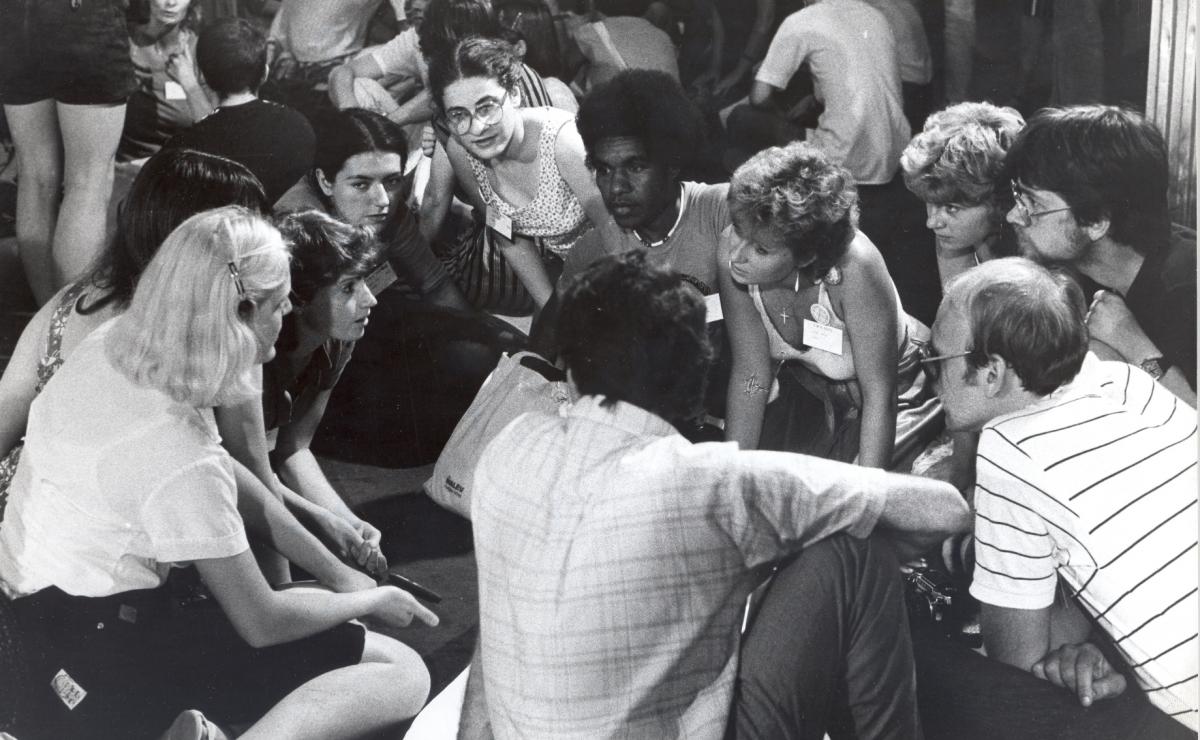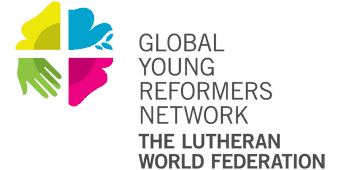Freed by God’s love... to be a young reformer at the LWF Budapest Assembly, 1984

My way to become a pastor
I myself am a young reformer and continue to support young reformers. You may be surprised that I call myself a “young reformer” at my age, but of course as long as you are molded in grace and in justification by faith you are always young in the Spirit!
I felt the call to become a pastor and preacher of the Gospel already when I was a young boy, age eleven. I was very young, but of course I believe that when God calls, God also equips and qualifies. When I was eighteen years old, I applied to study theology in Germany, hoping to receive a scholarship from the Lutheran World Federation. Unfortunately, the process did not go quickly, so for one year I studied Hebrew in the morning, and worked as doorkeeper and receptionist at Evangelical Lutheran Church of the Redeemer, Jerusalem in the afternoon, while I waited to prepare myself for ministry.
An interesting thing happened while I was waiting: On April 20, 1969 (I remember the date very well), two Finnish pastors came to Propst Koehler of the Evangelical Lutheran Church of the Redeemer and asked if he knew of a young Palestinian who would like to study diakonia in Finland. Propst Koehler, who was the spiritual leader of our church at that time, called my mother Alice, who presented the idea to me. I immediately said “NO!” I wanted to study Germany, and I wanted to study theology, not diakonia. But my mother prevailed. She told me, “Munib, you’re going to Finland. The Finns are good people, and if you succeed in your studies in diakonia, perhaps you can then continue in theology. Let’s not block this opportunity.” So I prayed about it. I listened to my mother, and to the convincing voice of my father, Andrea– and accepted the offer. I was given only six weeks to prepare travel documents and obtain a visa, which was not easy. By 6 June 1969, I was in Finland! I studied the Finnish language for three months, and then I joined the Seurakunta Opisto in Jäärvenpää to study diakonia—in Finnish! After two years, I applied to continue studies in theology at Helsinki University, and was accepted. My dream of becoming a pastor and preacher was coming true. This year, 30 May 2016, I will celebrate forty years of ordination, thanks be to God.
Youth leader with the Lutheran World Federation
My interest in the Lutheran World Federation began in the year of my ordination in 1976. Several LWF leaders encouraged me in my early pastoral work, including the Rev. Dr. Kalle Hellberg, LWF Director of Church Cooperation, and Dr. Kunchala Rajaratnam, LWF Asia Desk Secretary. They especially encouraged my work with the youth of the church.
One highlight of this was in 1981, when I was invited to be on the youth committee for planning the 1984 Youth Assembly in Budapest.
Young people from all over the world—the United States, Hungary, Hong Kong, Japan, from Nordic and African countries—formed the preparatory committee to plan the event. We met several times, in different locations. Of course we had no experience at all in planning such a huge event, and there were challenges.
What we noticed was that when we spoke on theology, we all agreed. But when we wanted to contextualize the pre-assembly activities, we could not agree on anything! Our cultural and contextual perspectives were very different. Our readings of the Bible were different. We had to work through these differences, knowing that we possessed one faith, one Christ, one Eucharist, and one justification by faith.
Being in solidarity with those who seek freedom
Prior to the pre-assembly of the youth, I was assigned to visit East Germany to meet with local people and understand their struggle for freedom. I was received by Rev. Harald Bretschneider, the youth pastor of the Saxonian Church. He was a very strong and powerful voice, and the leader of the half-legal peace movement in the church. He picked me up at Checkpoint Charlie in East Berlin and together we drove to Dresden in his Trabant car. With my bad German and Pastor Bretschneider’s bad English, we managed to understand each other on the drive! When we arrived in Dresden, we both had the very special smell of the East German gas emissions on our clothes. I stayed at his home, and he did not spare a moment to show me every kind of oppression that the people, including the youth, were experiencing in his country. In the evening Pastor Bretschneider invited me to a restaurant in the center of the town. We had to queue for over an hour to get a table in the restaurant. While we were waiting, some youth were shouting in the streets. The police were staring down every young person, including me. Rev. Bretschneider was teaching me how to behave in the presence of such intimidation, for he was well-known by the Stasi.
I could feel the deep fervor in his heart for freedom and justice for his people. He really loved his people, especially the youth. He was truly a Young Reformer in his community.
This experience in Dresden really prepared me for the youth pre-assembly gathering in Budapest. I was asking myself, “Which is easier: living under the occupation of my country, or living under the Iron Fist of communism?” At the end of the day, we had a very remarkable assembly, with a powerful theme: “Christ—Hope for the World.” Many people who are leaders in the LWF today were present there in Budapest, including Rev. Dr. Ishmael Noko. We were really hearing the voice of liberation as we met behind the iron curtain. Pastor Bretschneider of Dresden spoke of the end of injustice and communism. Rev. Allan Boesak of South Africa spoke of freedom and hope, which at that time seemed very far off indeed for his country. One South African youth presented a drama about his treatment under the apartheid regime, which left none of us without tears. At the same time, a Swedish rock band called Fjedur was leading us in singing an African song which proclaimed: “Freedom is coming—oh yes I know!”
How can we be in ongoing reformation ?
I remember feeling very caught up in the moment, and filled with hope that changes were really coming soon. However, I was also aware that just outside the assembly hall, the people of Hungary were still living under communism. I knew that Allan Boesak and the other South Africans were returning to an apartheid state. I also would return to a country struggling for freedom.
However, the yearning for liberation and justice was given a stubborn push in Budapest. We knew we were called not to give up. With Christ as our liberator, we always have hope. In him we can trust. Through him we are called to reform our broken world.
I still freshly remember the last evening of the assembly, which was celebrated with much food and many drinks, as is the custom in LWF circles. As we gathered in a small room to bid farewell to each other, there was a young woman from Romania there who was bitterly weeping. As a pastor, I came to her and asked, “Why are you crying, woman?” She told me: “I have experienced liberation and freedom in this assembly. And tomorrow it ends when I go home. Again I will be locked in a prison. I don’t know if I will see any of you anymore, or if I will ever travel out of Romania again.”
Of course, this touched me, and I remember it to this day. I saw with my own eyes the serious effect of oppression on a human being. What words could comfort and console her in such a moment? I did not know.
We were really filled with idealism there in Budapest—an idealism which grew from the Gospel of Jesus Christ. At the end of the assembly, we prepared a drama which issued a challenge to church leaders and to each other. We asked, “After we leave Budapest, what will YOU do for justice?” As young reformers we felt inspired, and believed that the time for justice had come to the church and to the world. In hindsight, the idealistic demands we proposed to the heads of churches were just that – idealistic! In fact, many of those demands would be a challenge for me as LWF President today!
Of course justice and peace have not yet come to many parts of the world, including my country. For many, the dreams of Budapest are still dreams. But just five years after that assembly, Hungary was liberated from communism. Miraculously, other nations followed the same path. South Africans no longer live under apartheid, and the wall that divided Berlin is now just a memory. Although freedom has not yet come to all people, our faith teaches us that Christ “is our peace; in his flesh he has made both groups into one and has broken down the dividing wall, that is, the hostility between us.” (Ephesians 2:14) As we sang together with the Swedish band in Budapest: “Freedom is coming—oh yes, I know!”
It is very remarkable for me to see how many participants of that Budapest Assembly have become leaders in the church and in the world today. I never dreamt that twenty-six years after Budapest I would be elected as President of the Lutheran World Federation, and that the leaders who voted for me would be the same young reformers from that assembly! I give thanks to God for that special opportunity to gather with youth from around the world, an experience which truly changed the course of my ministry and my life.
This is the reason I encourage churches and the Lutheran World Federation today to invest in and trust the young leaders in their midst. I urge church leaders and elders to understand that they possess their own wisdom and visions, which we need to hear.
These are the ones who will lead our churches, who will lead the Lutheran World Federation, and who will lead countries in the future. These are the Young Reformers who will lead our world from injustice to justice, from extremism to moderation, from conflict to communion, and who will proclaim the Gospel of love to the generations to come.
Even though I have been a pastor for forty years, I will always call myself a Young Reformer! Together with reformers of every age and from every country, I stand firm in faith, and ever grateful for the freedom of this church which continues to be Ecclesia Semper Reformanda.
By Bishop Munib Younan, Bishop of the Evangelical Lutheran Church in Jordan and the Holy Land and President of the Lutheran World Federation
